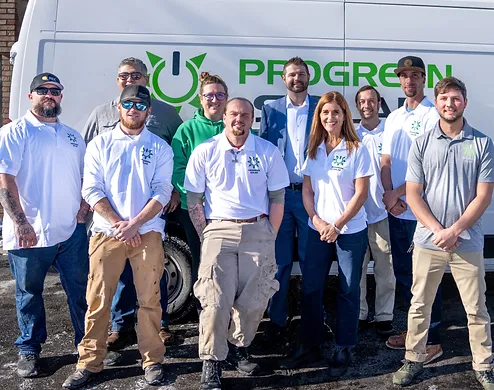The Ultimate Guide to Solar Panel Installation and Rebates for Colorado Residents

We have a serious question for you:
If you could go back in time to the 1990s and lock in gas rates at a few cents less per gallon, would you?
If you answered, “Of course!” you should take a few minutes to read the rest of this post.
Greenpoint Roofing is dedicated to providing top-quality roofing solutions, including solar panel installation, to Colorado residents. As part of our commitment to sustainability, we have partnered with our sister company, ProGreen Solar, to bring you comprehensive solar energy solutions. This guide will walk you through everything you need about solar panel installation and the various energy and tax rebates available to Colorado residents.
Why Install Solar Panels?
Solar panels are an excellent investment for homeowners looking to reduce their carbon footprint and energy costs. By harnessing the sun’s power, you can generate clean, renewable energy for your home, reducing dependence on traditional energy sources. Additionally, solar panels can increase the value of your property and provide savings on energy bills, all while costing you $0 out-of-pocket with current government incentives.
Benefits of Solar Energy
- Environmental Impact: Solar energy is renewable and reduces greenhouse gas emissions.
- Cost Savings: Lower monthly energy bills and protection against rising energy costs.
- Energy Independence: Reduce your dependence on the grid and protect yourself from power outages*.
Increased Property Value: According to Zillow, the largest online real estate company with zero stake in the solar industry, homes with solar sell for an average of 4.1% more than comparable homes without.
*Per NEC rapid shutdown requirements, if the grid goes down without batteries or islanding infrastructure, your solar power must stop producing.
Colorado has some of the country’s most favorable net metering laws, resulting in substantial savings from solar energy compared to other states. Net metering allows homeowners to receive credit for excess electricity their solar panels generate and feed back into the grid. This credit can offset the cost of electricity used when solar panels aren’t producing, such as at night or on cloudy days.
Installation Process
- Initial Consultation
- Site Assessment and Design
- Permitting and Approvals
- Installation
- Inspection and Activation
Once your locale and utility provider approves it, your system will be activated, and you will start generating solar energy. Note that obtaining Permission to Operate (PTO) from the utility can take up to 20 business days after passing inspection.
Energy and Tax Rebates for Colorado Residents
Federal Investment Tax Credit (ITC)
The Federal Investment Tax Credit (ITC) allows homeowners to deduct a significant percentage of their solar installation costs from their federal taxes. As of 2024, the ITC offers a 30% tax credit for systems installed through 2032.
Colorado State Incentives
Colorado Residential Renewable Energy Property Tax Exemption
This exemption ensures that the added value of a solar energy system will not increase your property taxes.
Colorado Sales Tax Exemption for Renewable Energy Equipment
Colorado provides a sales tax exemption for purchasing solar energy systems, which can result in significant savings.
Battery Tax Credit
Colorado offers a tax credit for battery storage systems.
Utility Company Rebates
Many utility companies in Colorado offer rebates for solar installations. These rebates can vary based on the utility provider and the size of your system. Notable providers include:
Xcel Energy offers a Solar*Rewards Program that provides incentives for residential solar installations. It also offers a Battery Connect Program.
- Black Hills Energy provides rebates for customers who install solar panels.
- United Power offers a battery incentive program.
- Financing Options
- Standard Solar Loans
Many financial institutions offer solar loans, allowing homeowners to finance their solar panel installations with low interest rates and flexible terms.
Colorado Clean Energy Fund (CCEF) Loans
CCEF is a Colorado-sponsored loan option that offers below-market rates with zero fees for green energy projects, often resulting in a better ROI when compared to Standard Solar Loan options. To take advantage of CCEF, you must work with an authorized CCEF contractor, such as Progreen Solar.
Batteries
Traditionally, unlike stand-alone solar for energy production, batteries in Colorado did not offer a positive return on investment. However, Xcel Energy, Colorado’s largest utility provider, has begun rolling out Time of Use (TOU) rates, allowing customers to see savings through energy arbitrage. When combined with the recent forced power outages that have impacted thousands of customers along the front range, batteries are now an attractive addition even for homes that already have solar.
Furthermore, through Xcel’s Battery Connect Program, adding a Tesla Powerwall 3 that normally would cost an average of $11,750 would be reduced to only $1,475 (or even free for low-income households). Batteries also help decentralize and stabilize our grid, strengthening our communities’ energy infrastructure.
Conclusion
Installing solar panels is an intelligent investment for Colorado residents looking to embrace renewable energy, reduce their carbon footprint, and save on energy costs. With numerous federal and state incentives available, now is the perfect time to switch to solar energy.
For a seamless and professional solar panel installation experience, we recommend partnering with our sister company, ProGreen Solar. Their expertise and dedication to customer satisfaction will ensure that your transition to solar energy is smooth and efficient.
Take the first step towards a sustainable future. Contact Greenpoint Roofing today to schedule your initial consultation and start your journey to clean, renewable energy.















